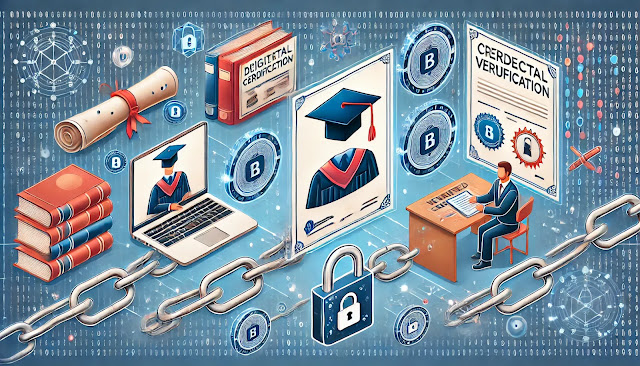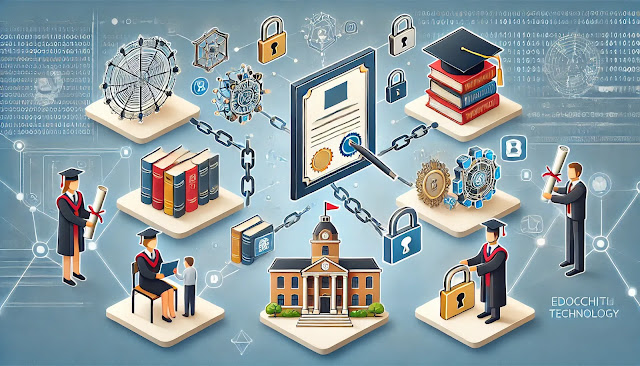Blockchain technology, best known for its role in
cryptocurrencies, is increasingly being recognized for its potential to
revolutionize various industries, including education. One of the most
promising applications of blockchain in education is credential verification.
By leveraging the inherent characteristics of blockchain—transparency,
security, and decentralization—educational institutions can ensure that
academic credentials are verifiable, tamper-proof, and easily accessible. This
transformation has significant implications for students, employers, and
educational institutions alike.
Understanding Blockchain Technology
Blockchain is a distributed ledger technology that records
transactions across a network of computers in a way that ensures the data is
secure, immutable, and transparent. Each record, or block, is linked to the
previous one, creating a chain of information that is nearly impossible to
alter without detection. This decentralized approach eliminates the need for
intermediaries and provides a high level of trust and security, making it an
ideal solution for credential verification in education.
The Current Challenges in Credential Verification
- Fraudulent
Credentials: One of the major challenges in credential verification is
the prevalence of fraudulent academic credentials. Fake diplomas and
certificates are widely available, making it difficult for employers and
educational institutions to verify the authenticity of a candidate’s
qualifications. This not only undermines the value of genuine credentials
but also poses a significant risk to organizations that rely on accurate
information for hiring and admissions.
- Inefficiency
and High Costs: The traditional process of credential verification is
often time-consuming and costly. It typically involves manual verification
by contacting issuing institutions, which can take days or even weeks.
This inefficiency is further compounded by the potential for human error,
leading to delays and increased costs for both institutions and employers.
- Data
Security and Privacy Concerns: With the increasing amount of personal
data being stored and shared online, data security and privacy have become
major concerns. Traditional databases are vulnerable to hacking and
unauthorized access, putting sensitive information at risk. Ensuring the
security and privacy of academic credentials is crucial to maintaining
trust in the educational system.
How Blockchain Revolutionizes Credential Verification
- Immutable
and Tamper-Proof Records: Blockchain technology ensures that once a
credential is recorded on the blockchain, it cannot be altered or tampered
with. Each credential is cryptographically secured and linked to the
previous record, creating a permanent and immutable record of academic
achievements. This eliminates the possibility of fraudulent credentials
and ensures that all information on the blockchain is accurate and
trustworthy.
- Decentralized
Verification Process: Blockchain’s decentralized nature removes the
need for intermediaries in the credential verification process. Instead of
relying on central authorities to verify credentials, employers and
educational institutions can directly access the blockchain to verify the
authenticity of a candidate’s qualifications. This streamlined process
reduces the time and cost associated with traditional verification
methods.
- Transparency
and Accessibility: Blockchain provides a transparent and easily
accessible platform for credential verification. Students can store their
academic credentials on the blockchain and share them with potential
employers or other institutions as needed. Employers can quickly verify
the credentials by accessing the blockchain, reducing the time and effort
required for the verification process. This transparency also empowers
students, as they have complete control over their academic records.
- Enhanced
Data Security and Privacy: Blockchain technology offers a high level
of security for storing and sharing academic credentials. The
decentralized and encrypted nature of blockchain ensures that sensitive
information is protected from unauthorized access and data breaches.
Additionally, students can control who has access to their credentials,
ensuring their privacy is maintained.
- Smart
Contracts for Automated Processes: Smart contracts, self-executing
contracts with the terms of the agreement directly written into code, can
be used to automate various processes in credential verification. For
example, a smart contract could automatically verify a credential when
certain conditions are met, such as a request from an employer. This
automation further reduces the time and cost associated with verification
while ensuring accuracy and reliability.
Challenges and Considerations
While blockchain offers significant advantages for
credential verification, there are also challenges and considerations that need
to be addressed:
- Standardization:
For blockchain-based credential verification to be widely adopted, there
needs to be standardization across institutions and industries. This
includes agreeing on the format and protocols for recording and verifying
credentials on the blockchain.
- Scalability:
As more institutions and students adopt blockchain for credential
verification, scalability becomes a concern. The blockchain must be able
to handle a large number of transactions efficiently without compromising
security or speed.
- Regulatory
and Legal Issues: The adoption of blockchain in education will require
careful consideration of regulatory and legal issues, including data
protection laws and intellectual property rights. Institutions must ensure
that their use of blockchain complies with relevant regulations and
protects the rights of all stakeholders.
Blockchain technology has the potential to revolutionize
credential verification in education by providing a secure, transparent, and
efficient solution. By addressing the challenges of fraudulent credentials,
inefficiencies, and data security, blockchain can enhance the trustworthiness
and accessibility of academic qualifications. As the technology continues to
evolve, it is likely that blockchain-based credential verification will become
the standard, benefiting students, employers, and educational institutions
alike. However, to fully realize this potential, challenges related to
standardization, scalability, and regulation must be carefully managed.






0 Comments